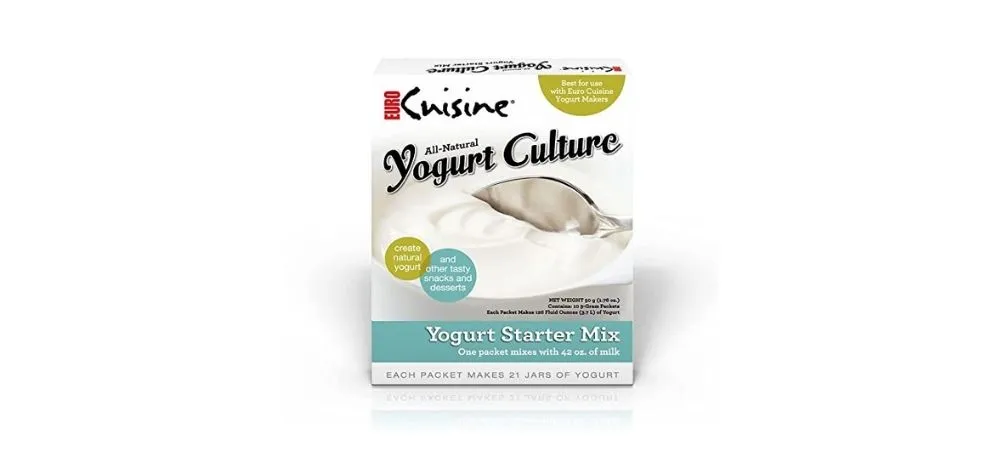Yogurt is a dairy product with a high nutritional value. It contains calcium, protein, vitamins B1 and D, and minerals such as phosphorus and iron. In addition to these nutrients, yogurt also contains friendly bacteria known as probiotics. The health benefits of the live cultures have been proven in scientific research, which may protect against allergies, lactose intolerance, and inflammatory bowel disease. Yogurt can be enjoyed on its own or as a side dish to cereal, fruit salad, or muesli.
Many manufacturers add sugar and flavorings such as vanilla, caramel, and fruit pieces before the yogurt is packaged and labeled. It means that at breakfast time, we can choose from an extensive range of flavored yogurts.
Related Posts:
- How much Yogurt is Too Much?
- How much Fiber is in Yogurt?
- What is the Healthiest Dairy – Fat, Non-Fat or Low Fat?
- What are the differences in Nutrition between Yogurt and Milk?
- What are the health benefits of Yogurt?
- How many Calories in a Yogurt Parfait?
- How many Carbs in Frozen Yogurt?
- How many Ounces of Yogurt in Cup?
Which yogurts do not contain artificial additives?
Artificial sweetener, colors and flavors
Manufacturers are not permitted to use artificial sweeteners in their products. These must only contain sugars such as glucose, fructose, or sucrose. Colors that may be added include curcumin, paprika extract, riboflavin, beta-carotene, and lycopene. The only flavors that may be added are those found in natural sources such as fruit or plants. Yogurts should not contain any artificial flavors.
Ingredients list
The ingredients list on the packaging must include a description of what is used to make the yogurt. For example, the ingredients list might say ‘milk’ or ‘cream’. The product may not contain added sugar if it contains lactose, a natural sugar present in milk. Yogurt must also have live bacterial cultures, for example, Lactobacillus bulgaricus and Streptococcus thermophilus.
Yes, it is healthy to eat flavored yogurt daily for breakfast. Yogurt is a good source of calcium and protein that are essential for our body. Flavored yogurt contains fruit or other ingredients that may be healthy or unhealthy depending on the type of flavorings added.
What are the benefits of eating flavoured yogurt?

Yogurt is a good source of calcium and protein that are essential for our body. A serving of yogurt may contain 10% to 25% of the daily recommended intake of these two nutrients depending on the type of flavorings added. Yogurt is also a substitute for high-calorie snacks such as cakes or ice-creams.
Related Posts:
What are the health risks of eating flavoured yogurt?
Health risks vary according to the type of flavorings added to the yogurt. For instance, being sweetened with sugar may result in weight gain and tooth decay. Flavored yogurt containing high-fructose corn syrup instead of table sugar may have high levels of fructose which is terrible for our health if consumed excessively.
What are the types of flavoured yogurt?
There are various types of flavored yogurts available in the market with different ingredients added to them. Some examples include; low-sugar strawberry, vanilla, blueberry, and plain. Low-fat flavored yogurt is also available with artificial sweeteners like aspartame or sucralose.
What are the recommended daily portions of flavoured yogurt?
Daily recommended intakes vary according to age and gender. However, 1-2 servings, equivalent to 1-1.5 cups of yogurt for adults, would be sufficient. The younger you are, the smaller serving size you need as your body requires lesser nutrients than older people do.
What are some other health tips regarding flavoured yogurts?

Low fat or portion-controlled yogurts with no added flavorings is recommended for weight management. Yogurt is beneficial to the body only if it is part of a healthy dietary plan. Flavored yogurt with high sugar content would be harmful to weight management and dental hygiene, so we must read the nutrition facts before eating food.
What is a serving of yogurt, and what would be the recommended portions?
A serving size for yogurt varies according to age and gender. It ranges from 1 cup (8 ounces/227 grams) to 2 cups (16 ounces/454 grams) per day, depending on the individual’s needs. A cup is equivalent to measuring up to the top of an 8-ounce drinking glass.
What are the recommended daily allowances for calcium and protein?
Recommended daily intakes of calcium and protein vary according to age and gender. Adults aged 19-50 years require 1000 milligrams (mg) of calcium per day, while those over 50 years old require 1200 mg. Recommended daily protein intakes for adults range from 46 to 56 grams per day.
What would be the health risks if we were to exceed the recommended portions of yogurt?
Exceeding the recommended amounts of calcium and protein leads to chronic diseases such as osteoporosis, hypertension, and atherosclerosis.
Conclusion
Flavored yogurt contains fruits or other ingredients that may be healthy or unhealthy depending on the type of flavorings added. The benefits are high in calcium and protein, which are essential for our body, but it is necessary to control the portions lest they lead to chronic diseases.











